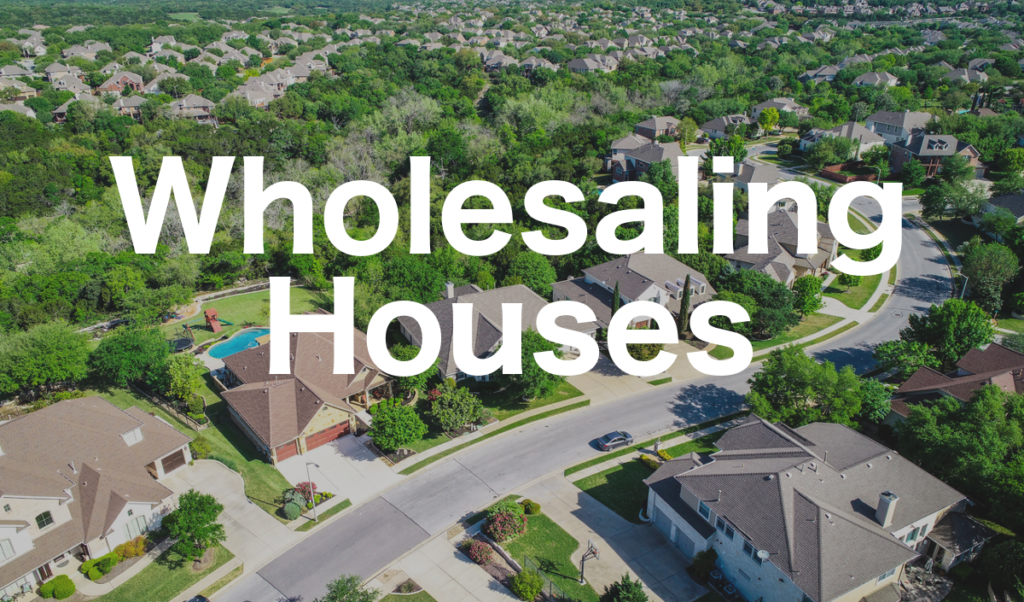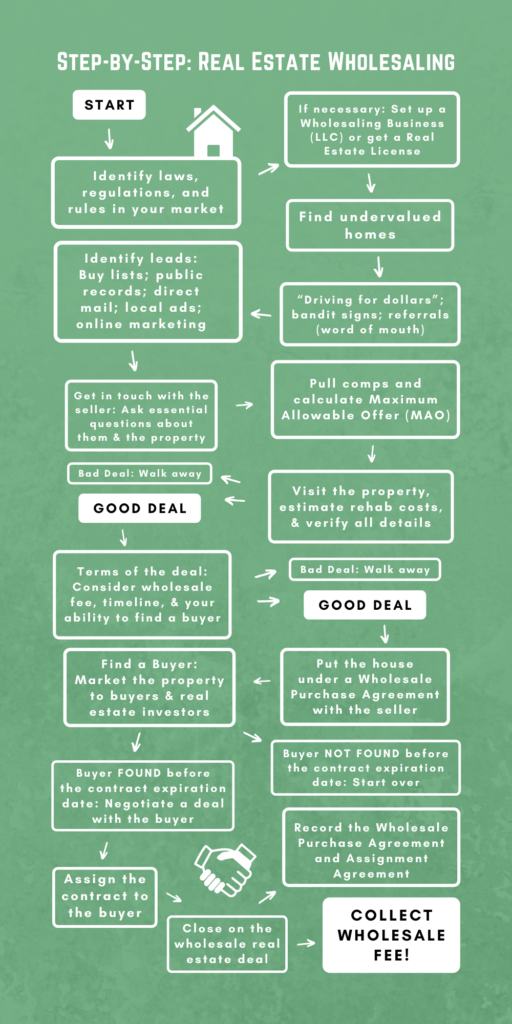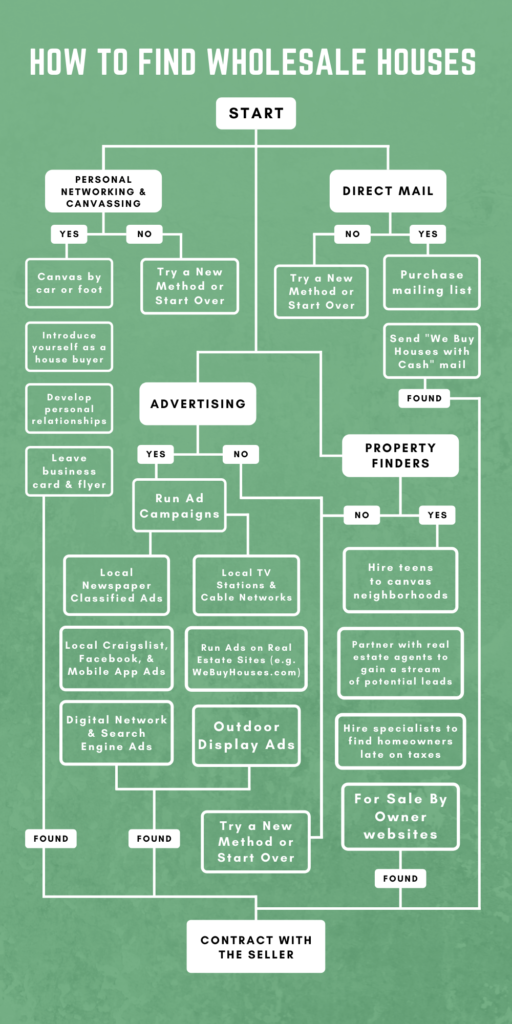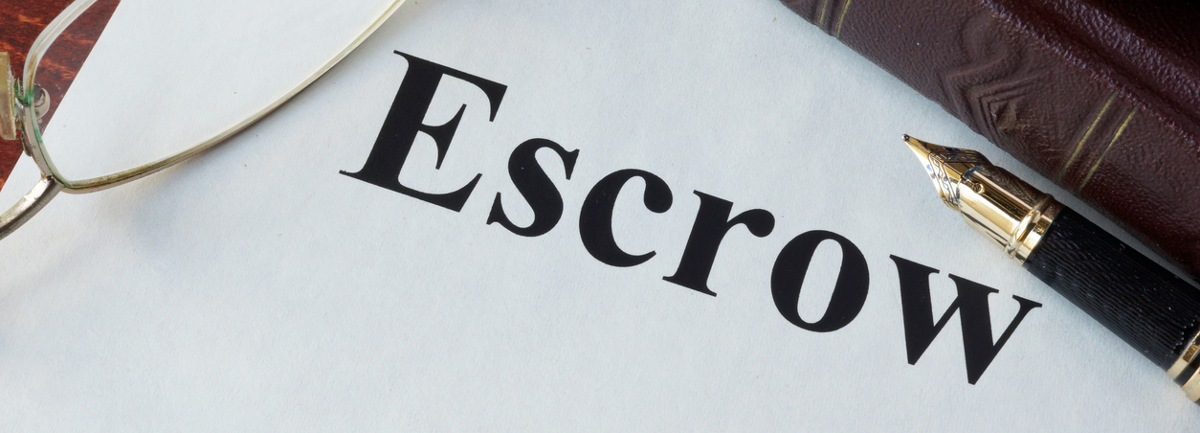
Learn how wholesaling houses works in this in-depth article. You will find lots of useful information, FAQs and detailed answers to learn about wholesaling houses below.
What Is Wholesaling Houses?
Wholesaling houses is a short term business strategy that involves the buying and selling of real estate contracts.
House wholesalers find distressed or under-valued properties, then sign exclusive contracts with the owners to find buyers for their houses.
At a high level a house wholesaler:
1) Finds and contracts with distressed property sellers,
2) Finds buyers for those properties, and
3) Makes money by selling the purchase contract
How to Wholesale Houses
Watch the video below to learn the in-depth steps required in wholesaling houses.
The key to wholesaling houses is that the wholesaler never takes ownership in the property — only the contract changes hands. This allows the wholesaler to match house buyers and sellers, making money from a transaction spread on the purchase contract. This speeds up the transaction. It also eliminates the risks and financing required to buy and sell real estate.
House wholesalers make money by selling the right to purchase a house at a discounted price. The buyer / investor simply purchases the contractual right to purchase the house at a discounted price. The wholesaler does not charge the seller of the house.
The homeowner is typically in a financially distressed situation (divorce, death or health problem) and needs to convert the house into cash quickly. The homeowner will often agree to sell at a discounted price in exchange for a quick sale. Wholesale house purchases usually do not involve a real estate agent, cutting out a significant transaction cost.
Read more about what wholesaling houses entails here >
Wholesaling Houses Step-by-Step
Below is a step-by-step guide to how wholesaling houses works.
STEP #1 Set Up a House Wholesaling Business
In most states, it’s best to set up a Limited Liability Company (LLC) as the legal entity to run your house wholesaling business. This insulates you from potential liability, should any of your wholesale deals go bad. Learn more about LLCs here >
A license is unnecessary in most U.S. locations to wholesale properties. You do not need to be a licensed real estate agent or broker. You simply need a standard business license and bank account.
Wholesaling houses is a business and should be treated that way. You will need business basics such as a phone, website, printer, business cards, flyers, letterhead, CPA, etc. You will need solid wholesale contracts tailored for your state’s legal requirements (get a lawyer to create them for you). You should also budget between $5,000 to $10,000 for advertising and direct mail campaigns.

STEP #2 Find Undervalued Houses to Wholesale
The next step is to source undervalued and distressed houses that you can wholesale. There are a number of ways to do this (discussed below).
In the beginning, new wholesalers should network and canvass neighborhoods locally, looking for distressed houses. After that, you can invest in direct mail and ad campaigns that target financially distressed homeowners. Learn more about running wholesaling houses ads here >
STEP #3 Sign a Wholesale Purchase Agreement With the Homeowner / Seller
Once you’ve found several distressed houses, approach the homeowners personally or by letter. Offer to find them an immediate all-cash buyer for their house (it helps to have these cash buyers ready, of course).
Homeowners looking for a quick sale get motivated when they hear “all-cash buyer”. This means the sale can occur quickly without mortgage approvals or banks involved.
The wholesaler’s job at this point is to explain how the wholesale transaction works and why it’s good for the seller.
The purchase price is typically discounted significantly for costs necessary to rehab and correct any liens or title issues on the property. These are costs a buyer will need to incur later to make the house marketable.
After agreeing to a price the wholesaler and homeowner sign an exclusive Wholesale Purchase Agreement. In this Agreement the wholesaler agrees to find a cash buyer at or above a specified price. Once this Agreement is signed, the wholesaler can record it at the County Recorder’s office. Learn more about wholesaling contracts here >
STEP #4 Sell the Contract to a Cash Buyer / Investor
Once the wholesaler has a signed Wholesale Purchase Agreement in hand, he or she offers to sell it to a buyer in exchange for a transaction fee or “spread”.
There may be some back-and-forth negotiation on the price of the contract, or the parties may agree to a standard fee. The greater the spread, the more the wholesaler makes.
Once the parties agree on a price, they execute an Assignment Agreement. This transfers the contractual right to purchase the house to the new buyer/investor. This Assignment Agreement is embedded in the Wholesale Purchase Agreement, so it is quick and easy to sign over the contract to the cash buyer. This is known as “assigning the contract”.
STEP #5 Record the Wholesale Purchase Agreement and Assignment Agreement
The final step is for the house wholesaler to record the Wholesale Purchase Agreement with the seller and the Assignment Agreement with the buyer at the County Recorder’s office. This formalizes the wholesale transaction and protects the rights of all parties. The buyer then pays the wholesaler and proceeds with purchasing the house with cash.
Read more about the steps involved in wholesaling houses here >
Sourcing Wholesale Houses
One of the biggest challenges when getting started wholesaling houses is finding undervalued properties with willing sellers.

Personal Networking & Canvassing
When you first start out wholesaling houses, it’s best to use personal networking. Canvas neighborhoods by car and foot. Focusing on your local market works best because you can be continuously available for new opportunities when they pop up.
When you drive and walk neighborhoods, stop and talk to people — particularly retirees who have been in the area a long time. Introduce yourself as a house buyer (most people won’t understand what wholesaling houses is).
Ask “do you know anybody who might be looking to sell their house quickly because of a divorce, health problem or death in the family?” This will often uncover opportunities. Be friendly and build personal relationships. If the individual has a personal relationship with the seller it can also get you warm introductions.
As you speak with people, leave your business card and a flyer or refrigerator magnet with them.
A blurb on the back of your card offering $100 for good leads can go a long way.
Pick a new neighborhood or two and canvass them on weekends when people are out and not at work. Look for “fixer” houses that can be promising investments for fix & flip or rental investors.
Direct Mail Campaigns
Throwing a wide net using direct mail is another technique to source wholesale houses.
Direct mail prompts the homeowner to phone or email you at a number listed on the mailer. This creates an inbound flow of potential wholesale deals.
There are many companies that offer “we buy houses with cash” direct mail lists and campaigns at a very reasonable price.
Mailers come in many shapes and sizes, from letters to postcards to refrigerator magnets. These are designed to stand out, cut through mounds of junk mail and and get the attention of a homeowner.
You can also include your flyers with local discount shopping mailer services. Almost every city and town across the U.S. has a company or two that sends out mailers with discount offers from pizza parlors, HVAC companies, landscapers, mobile phone services, and much more. These reach nearly every household, and it can be a good way to get the word out broadly.
Keep in mind direct mail is a high-volume, low-probability game. For every 1,000 or so letters you may get only 5-10 inquiries and 1-2 wholesale deals. Direct mail requires persistence and repetition — with 5-10 pieces of mail per person common. Be prepared to spend $5,000-$10,000 on a 3-month campaign.
Advertising
Another way to find wholesale houses with willing sellers is to run ad campaigns in print and online media.
Local newspapers and “city rags” offer cheap classifieds sections. You can usually get a substantial discount by buying multiple months at a time.
Craigslist, Facebook local, and local mobile apps are all places you can run ads for free or cheap.
Facebook Ads, Google AdWords, Bing Ads, Yelp Ads and other digital networks are all potential advertising channels. These networks allow you to geo target pay-per-click ads to people in specific ZIP codes. In some cases, you can even target demographics like age, household income, etc.
Local TV stations and cable networks offer ads that reach viewers directly. Beside the cost of creating the video ads, you can buy a substantial number of impressions relatively cheaply. This is particularly true if you run ads late at night or in the early morning — times when distressed homeowners are often up and watching television.
You can run ads on a website like WeBuyHouses.com to get wholesaling houses leads. These sites attract millions of visits from people looking to sell their houses for cash. You can run ads or pay for leads from ZIP codes you specify. You are matched directly with house sellers through the website.
Outdoor display ads can be useful as well. Bus stops, benches on busy streets, and even highway billboards are all viable ways to source wholesale house leads. It comes down to your budget.
Property Finders
You can (and should) leverage other people to find wholesale house leads for you.
No time to canvas neighborhoods yourself? Hire an army of teens to canvas neighborhoods for you on a commission basis.
Hire specialists to visit the county Tax Assessor’s office to find homeowners late on their taxes. Back taxes are a good indicator of financial urgency. (There are dedicated paid services that do this as well).
Real estate agents can be a great source of wholesaling houses leads. Many owners (particularly older ones) do not want to pay an agent a commission to market and sell their home. Building relationships with real estate agents in town can get you a stream of client “rejects” that the agent couldn’t land.
There are a few websites where owners list their homes for sale directly: FSBO and ForSaleByOwner are two of them. You’re unlikely to find deeply discounted properties here but it’s worth looking if you’ve got good cash buyers.
Finding Buyers for Wholesale Houses
Buyers of wholesale houses are typically property investors looking to rehab and flip, or rehab and rent the property. So how do you find these investors?

Here are a few ways to identify who buys wholesale houses:
Contact the “We Buy Houses” Ads in Your Area
These ads are run by property investors and other wholesalers to find properties. These are motivated buyers with access to ample cash. This is a good way to develop investor relationships and turn over houses quickly.
Attend REIA Meetings in Your Area
REIA (Real Estate Investment Association) meetings are well-attended by individual and institutional real estate investors looking for discounted properties. You can also check out our list of house flipping investment groups here >
Run Ads Online or In Your Local Paper
Running advertisements online or in your local paper’s real estate section is a good way to find investors who buy wholesale houses for cash. Make sure to incorporate keywords in your ads such as “below market”, “cheap” and “profitable”. And include an easy way for investors to contact you.
Wholesaling Houses – Handling Tax Liens

Many wholesale properties you come across will have some sort of tax lien issue. People in good financial condition generally don’t sell their home at a discount to quick cash buyers. So you can assume the owner is in some financial distress.
It’s essential that you consider the cost to cure a tax lien when agreeing to a wholesale house price. You need to do your due diligence by checking with the total tax authority to determine the size of the tax lien on the property. Curing a tax lien is required to make the house marketable, so it must come out of the sale price.
Also keep in mind that the Tax Assessor may be in the process of foreclosing on the homeowner when you come long. If the Tax Assessor has started foreclosing on the tax lien, then you have to get the deal closed fast before the house gets sold at auction.
Tax foreclosures are a big risk factor in wholesaling houses. You don’t want to sign a wholesale contract, assign it to a buyer, then have the house sold at a tax sale before the buyer can make the house purchase. In that case, you would need to refund the contract sale price plus any associated costs to the buyer.
It is important to investigate tax liens and other foreclosure liens. No matter how much “buyer beware” language you include in the assignment contract, if the property is sold at a tax auction before the investor completes the purchase will come looking for his money back.
Escrow Nuances for Wholesaling Houses

The escrow process for wholesaling houses is often poorly understood. However, getting through escrow is essential to close wholesale deals and you must know how it works.
After a wholesaler assigns the Purchase Agreement (right to purchase) to an investor the next step is for the wholesaler to take this assignment contract to an escrow company. There the wholesaler opens an escrow account and submits the signed Purchase Agreement and Assignment Agreement.
Either the wholesaler or buyer / investor will then order a title search. The wholesaler may have already informed the buyer of known title or lien issues, but this step is necessary to get all the facts. It takes 3 to 5 days to get the title search report and it is shared with both parties involved in the contract.
The escrow agent may also ask for other contract-related information, such as:
- Beneficiary statements
- Taxes
- Review of transfer terms
- Insurance
The wholesale transaction will move to escrow closing. The escrow agent will sit down and review the file, ensuring that all the terms and conditions have been met. They will ensure the documents are correct and available for signatures.
Finally, the parties will meet and sign any necessary documents and the buyer / investor will transfer the wholesale contract purchase price to the wholesaler. The transaction is recorded and the file is closed.
Wholesaling Houses vs. Alternatives

There are other ways to make money flipping houses than wholesaling. Depending on your skills, time and resources, you may choose one or more of these techniques.
- Fix & Flip Houses. Buying, rehabbing and flipping houses is good for hands-on types willing and able to “get their hands dirty” with construction projects. This is an excellent choice for people in the residential construction business who know what they’re doing and have access to reliable skilled labor. Many fix & flip houses need only cosmetic upgrades, while others require full rebuilds. Fix & flip is the “bread and butter” of house flipping.
- Flipping Foreclosure Auctions. Flipping foreclosed houses can be a rich source of undervalued properties. But buying the right one at auction requires skill, focus and persistence.
- Flipping Short Sales. Flipping short sale houses is a common tactic during recessions after big drops in a local real estate market. Short sales occur when lots of houses sit on the market unsold and their owners are “underwater” on their mortgages. In this case the bank decides to accept a loss on the mortgage balance instead of having to complete a foreclosure and sell the house at auction at an even bigger loss. Buying short sale houses requires patience as the bank is directly involved and short sales require lots of approvals.
- Flipping REOs. Real estate owned by banks that have “taken the property back” after foreclosing and being unable to sell it at auction is another option for house flippers. The good thing about REOs is the bank has normally cleared all liens and made the house marketable before putting it up for sale. The bad thing about REOs is they are typically sold in the retail market so finding one at a significantly discounted price is challenging. The REO market is good for live-in flippers and longer term rental investors.
Wholesaling Houses FAQs
You can read all our wholesaling houses articles here >
Dig in deeper to learn the nitty-gritty details of house wholesaling with the links below.

- Reverse Wholesaling versus Wholesaling
- Wholesaling Houses Case Study
- Where to Find Properties for Wholesaling?
- How Do You Network to Find Wholesale Houses?
- Are Wholesale Houses Better than HUD Houses?
- Wholesaling Houses—Step by Step Process
- How Does The Escrow Process Work For Wholesale Houses?
- Do We Buy Houses Ads Work For Wholesaling Houses?
- Can You Wholesale Houses Without a Limited Liability Company (LLC)?
- Can You Wholesale Houses That Have Liens?
- Can You Wholesale Houses That Have a Mortgage?
- Can Unlicensed Investors Wholesale Houses?
- Can Realtors Wholesale Houses?
- How to Wholesale Houses in a Competitive Market?
- Wholesaling Houses: A Contract Example
- Can You Wholesale Houses Using a Loan?
- Is Wholesaling Houses Better Than Fix & Flip Houses?
- Are Wholesale Houses Better Than Foreclosures?
- Are Wholesale Houses a Scam?
- What is the Best Way to Advertise to Find Wholesale Houses?
- Do you need a license to wholesale houses?
- Can you wholesale houses using investor money?
- Are wholesale houses better than REO properties?
- Who buys wholesale houses?
- What are wholesale houses?
- Should I flip wholesale houses?
- How to put a wholesale house under contract?
- How to find wholesale houses?
- Can you wholesale houses without cash?
